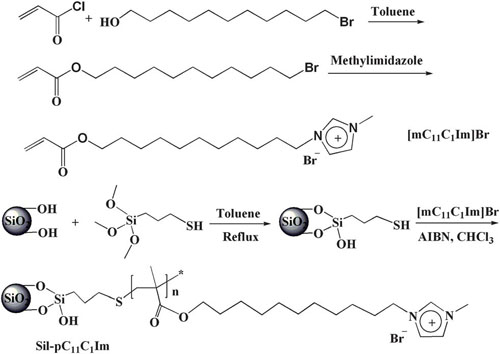Mixed-mode chromatography (MMC) is a type of chromatography in which the chromatographic stationary phase interacts with solutes through more than one interaction mode. MMC has some advantages over conventional single-mode chromatography, such as high selectivity and high loading capacity. With the booming development of ionic liquids (ILs) for academic research and industrial applications, ILs have been widely studied as a new kind of material in analytical science. However, there are very few reports that describe IL-modified silica stationary phases used in hydrophilic interaction liquid chromatography (HILIC).
Researchers at Kumamoto University, Lanzhou Institute of Chemical Physics (LICP) of Chinese Academy of Science (CAS), and cKumamoto Institute for Photo-Electro Organics (Phoenics) have prepared a new multi-mode poly(ionic liquid)- grafted silica stationary phase based on the synthesis of the ionic liquid monomer and its polymerization on the silica via surface-initiated radical chain-transfer reaction.
 |
|
Synthesis of new multi-mode stationary phase (Sil-pC11C1Im). |
This new material contains carbonyl, polar imidazolium, and hydrophobic alkyl chain groups as interaction sources. Compared with commonly used ODS columns, Sil-pC11C1Im shows considerably higher molecular-planarity selectivity towards PAH isomers, additional anion-exchange ability and available HILIC mode. The multiple interactions induced by imidazolium and the alkyl chain allow the ionic-liquid-modified silica to serve as a multi-mode stationary phase in HPLC.
This work was supported by the Grant-in-Aid for Scientific Research from the Ministry of Education, Culture, Sports, Science and Technology of Japan, and Grant-in-Aid for Program for Fostering Regional Innovation.
The findings have been published in Analyst(Analyst,2012, 137, 2553–2555).


